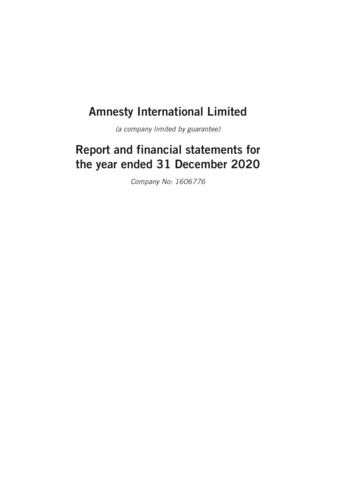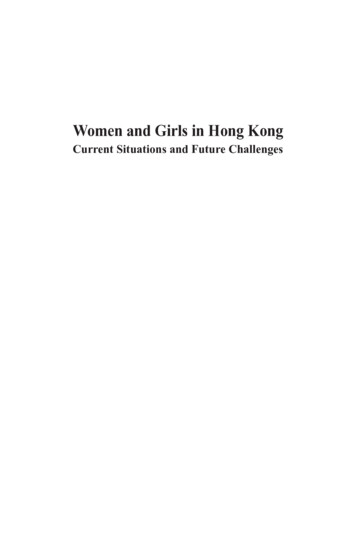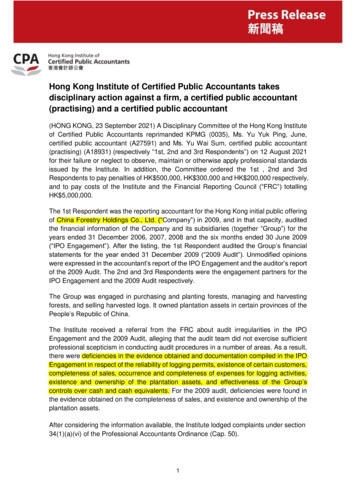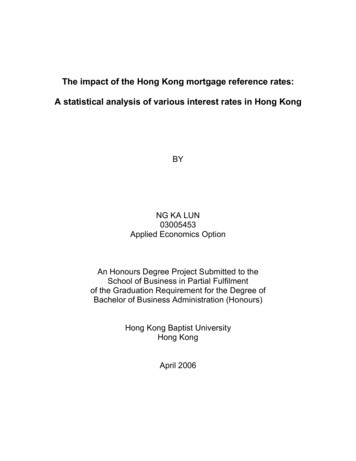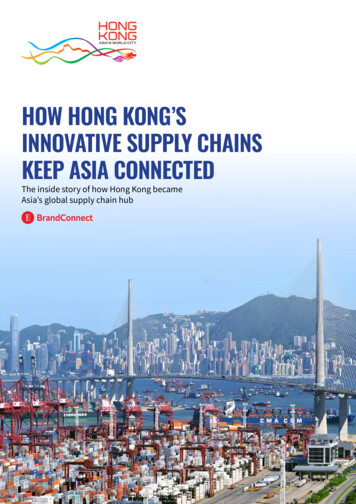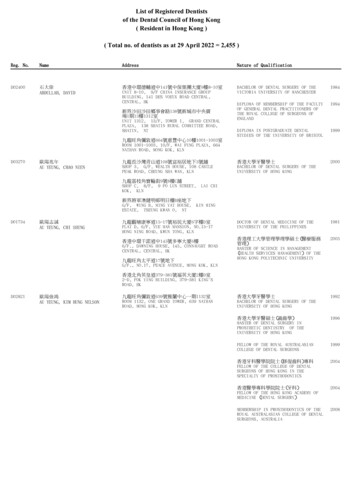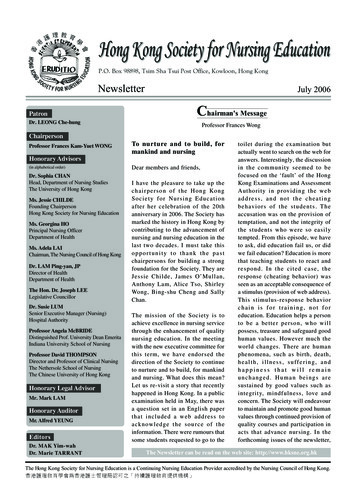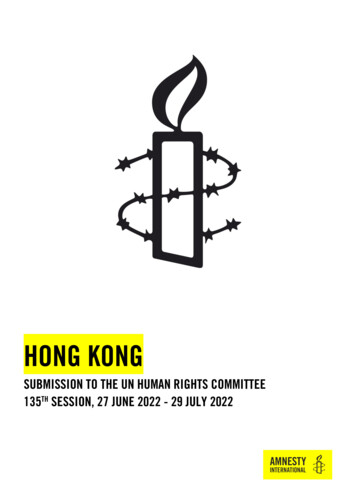
Transcription
HONG KONGSUBMISSION TO THE UN HUMAN RIGHTS COMMITTEE135TH SESSION, 27 JUNE 2022 - 29 JULY 2022
Amnesty International is a movement of 10 million peoplewhich mobilizes the humanity in everyone and campaignsfor change so we can all enjoy our human rights. Our visionis of a world where those in power keep their promises,respect international law and are held to account. We areindependent of any government, political ideology, economicinterest or religion and are funded mainly by our membershipand individual donations. We believe that acting in solidarityand compassion with people everywhere can change oursocieties for the better. Amnesty International 2022Except where otherwise noted, content in this document is licensed under a Creative Commons(attribution, non-commercial, no derivatives, international 4.0) -nd/4.0/legalcodeFor more information please visit the permissions page on our website: www.amnesty.orgWhere material is attributed to a copyright owner other than Amnesty International thismaterial is not subject to the Creative Commons licence.First published in 2022by Amnesty International LtdPeter Benenson House, 1 Easton StreetLondon WC1X 0DW, UKIndex: ASA 17/5663/2022Original language: Englishamnesty.org
CONTENTS1. INTRODUCTION52. EMERGENCY REGULATIONS ORDINANCE, NATIONAL SECURITY, SEDITION (ARTICLES 2,4,21)52.1 EMERGENCY REGULATIONS ORDINANCE52.2 NATIONAL SECURITY62.3 SEDITION72.4 RECOMMENDATIONS83. FREEDOM OF EXPRESSION (ARTICLE 19)93.1 FREEDOM OF EXPRESSION IN THE CONTEXT OF9LEGISLATIVE BODIES93.2 PRESS FREEDOM103.3 RECOMMENDATIONS114. FREEDOM OF ASSOCIATION (ARTICLE 22)114.1 CRACKDOWN ON CIVIL SOCIETY ORGANIZATIONS114.2 CRACKDOWN ON TRADE UNIONS124.3 RECOMMENDATIONS135. FREEDOM OF PEACEFUL ASSEMBLY (ARTICLE 21)135.1 THE CRACKDOWN ON PROTESTS IN 2019-2020135.2 RECOMMENDATIONS146. USE OF FORCE BY LAW ENFORCEMENT OFFICIALS157. ARBITRARY ARREST OR DETENTION; AND TORTURE OR OTHER CRUEL, INHUMAN OR DEGRADINGTREATMENT (ARTICLES 6, 7, 9)177.1 ARBITRARY DETENTION 2019 PROTESTS177.2 RECOMMENDATIONS178. RIGHT TO LIBERTY AND FAIR TRIAL (ARTICLES 9,14,15)188.1 STRINGENT THRESHOLD FOR BAIL AND PROLONGED PERIOD OF PRETRIAL DETENTION188.2 SPECIALLY APPOINTED JUDGES FOR NATIONAL SECURITY LAW CASES198.3 RIGHT TO LEGAL COUNSEL198.4 RETROACTIVITY208.5 EXTENSION OF THE APPLICABILITY OF NATIONAL SECURITY LAW PROVISIONS20HONG KONGSUBMISSION TO THE UN HUMAN RIGHTS COMMITTEE, JUNE 2022Amnesty International3
8.6 RECOMMENDATIONS219. DISCRIMINATION ON THE GROUNDS OF SEXUAL ORIENTATION, GENDER IDENTITY, GENDER EXPRESSIONAND SEX CHARACTERISTICS (ARTICLES 2,17,26)219.1 OVERVIEW219.2 RECOMMENDATIONS2210. ASYLUM SEEKERS AND REFUGEES (ARTICLES 2,7,14)2310.1 OVERVIEW2310.2 RECOMMENDATIONS2411. MIGRANT DOMESTIC WORKERS (ARTICLES 2,7,8,26)2411.1 OVERVIEW2411.2 RECOMMENDATIONS2512. SEX WORKERS (ARTICLES 2,9,14)2612.1 OVERVIEW2612.2 RECOMMENDATIONS26HONG KONGSUBMISSION TO THE UN HUMAN RIGHTS COMMITTEE, JUNE 2022Amnesty International4
1. INTRODUCTIONAmnesty International provides the following information to the UN Human Rights Committee ahead of the 4thperiodic report of Hong Kong at the Committee’s 135th session in July 2022.This submission sets out some of Amnesty International’s key concerns and recommendations related to theimplementation of the International Covenant on Civil and Political Rights (the Covenant) by the governmentof the Hong Kong SAR (HKSAR). It highlights concerns with regard to Emergency Regulations Ordinance,National Security, Sedition; freedom of expression; freedom of association; freedom of peaceful assembly; useof force by law enforcement officials; arbitrary arrest of detention and torture or other cruel, inhuman ordegrading treatment; right to liberty and fair trial; discrimination on the grounds of sexual orientation, genderidentity, gender expression and sex characteristics; asylum-seekers and refugees; migrant workers; and sexworkers. It is not an exhaustive account of Amnesty International’s concerns with regard to the implementationof the Covenant.It must be noted that the civil society landscape has changed drastically since the last review session. Afterthe 2019 protests, the government weaponized laws, including the overly broad National Security Law andlaws that had not been used for prosecution since 1967, to crackdown on civil society groups. Local civilsociety groups that used to take part in the review process were forced to disband, prosecuted, or deterredfrom continuing international advocacy work for fear of prosecution.12. EMERGENCY REGULATIONSORDINANCE, NATIONALSECURITY, SEDITION(ARTICLES 2,4,21)2.1 EMERGENCY REGULATIONS ORDINANCEOn 4 October 2019, the government invoked the Emergency Regulations Ordinance 1922 (ERO) to adopt theProhibition on Face Covering Regulation (PFCR), which imposes an almost total ban on mask-wearing at publicassemblies. In response to a judicial review challenging the adoption of the PFCO, the Court of Final Appealruled that the Chief Executive should be given discretion, and so the ban was not unlawful.2When the Chief Executive announced the adoption of the PFCR, she did not state that Hong Kong was in astate of emergency. Instead, she said there was a “state of serious public danger”.3 This raises the concernSee Section 4.1 Crackdown on civil society organization.Kwok Wing Hang and Others v Chief Executive in Council and Another; Leung Kwok Hung v Secretary for Justice and Another (HKCFA42), Hong Kong Court of Final Appeal (2020), n/2020/FACV000006 2020.docx3“Hong Kong leader rolls out emergency mask law to quell anti-government protests”, South China Morning Post, 5 October quell-anti12HONG KONGSUBMISSION TO THE UN HUMAN RIGHTS COMMITTEE, JUNE 2022Amnesty International5
that the ERO is being used, and could be used in the future, in situations that are not sufficiently serious towarrant the more substantial limitations on human rights that are permissible in times of emergency only.4In April 2020, the Court of Appeal overruled a Court of First Instance judgment and held that the ERO isconstitutional and the Chief Executive has the power to issue emergency regulations on grounds of “publicdanger”.5 The current wording and application of the Emergency Regulation Ordinance (ERO) mean that itcan be used in situations that are not states of emergency, despite the fact that the extensive powers providedunder the ERO reflect those normally under international law reserved only for the duration of an officiallyproclaimed state of emergency that threatens the life of the nation. When imposing the “mask ban” in October2019, Chief Executive Carrie Lam stressed that Hong Kong was not in a “state of emergency”.The adoption of the PFCR was fast-tracked using the Emergency Regulations Ordinance (ERO), a colonial lawdating back to 1922 that provides the power to introduce “any regulations whatsoever” the Chief Executive inCouncil considers “desirable”. 6 The wording of the ERO essentially provides a blank cheque for theGovernment to restrict human rights without any time limit, conditions or safeguards. The ERO is an outdatedand deeply flawed piece of legislation that grants the executive branch extensive unchecked power. Under itswording, emergency measures in a broad range of areas can only be imposed and then repealed by theexecutive branch of government; they supersede any other piece of legislation or other rule in case of conflict,seemingly regardless of which rule is more recent or its position in the legal hierarchy. Moreover, there are norequirements of periodic review, explicit renewal or any other prescribed form of emergency regulationsceasing to have effect. Both the decision to declare that an “emergency or public danger” exists and allmeasures taken in response are at the exclusive discretion of the executive, without expressly requiringinvolvement of the Legislative Council. In terms of process, using the ERO means that Hong Kong’s legislatureis bypassed during the law-making process. However, it should be noted that the Hong Kong Government hasconfirmed that any “regulations under the ERO would be subsidiary legislation and therefore subject to vettingby the Legislative Council”.7In its reports to the Human Rights Committee, the Hong Kong Government has always referred to the ERO inthe context of states of emergency as set out in Article 4 of the Covenant. For example, when responding toconcerns about the absence of detailed legislation covering emergencies and that the provisions of Article 18of the Basic Law did not correspond with those of Article 4 of the ICCPR, it stated that any regulationsnecessitated by future “emergencies” would be consistent with Article 4.8 At no point did it state that the EROcould be applied outside of situations as contemplated by Article 4, or that “occasions of public danger”would be subject to a separate framework. Instead, it acknowledged that the power granted under the ERO“appears to be very wide” but that it was subject to the human rights protection of the Covenant, amongothers.92.2 NATIONAL SECURITYIn May 2020, China’s National People’s Congress (NPC) approved a decision authorizing its StandingCommittee to pass the National Security Law (NSL). On 30 June 2020, the National People’s CongressStanding Committee (NPCSC) issued legislation directly adding the NSL to Annex III of the Hong Kong BasicLaw and announcing that the new law would be directly promulgated by the Hong Kong government, insteadof being made into local legislation. Despite the government’s claim that the NPCSC had sufficiently gaugedthe view of different sectors in Hong Kong, the NSL, enactment of the law in this way meant that the HongKong legislature was effectively bypassed, and the sequence of events left no other channels for any formalAmnesty International Hong Kong, Submission to Legislative Council Subcommittee on the Prohibition on Face Covering Regulation, 8November 2019, amnesty.be/IMG/pdf/hk submissionlegcosubcommittee.pdf5Kwok Wing Hang and Others v Chief Executive in Council and Another; Leung Kwok Hung v Secretary for Justice and Another (HKCFI2820), Hong Kong Court of First Instance (2019), n/2019/HCAL002945A 2019.docx,paras 166, 193 ; Kwok Wing Hang and Others v Chief Executive in Council and Another; Leung Kwok Hung v Secretary for Justice andAnother (HKCFA 42), Hong Kong Court of Final Appeal other/en/2019/CACV000541A 2019.docx, paras 346, 348, 349, 351, 352.6Article 2(1) of the Emergency Ordinance Regulation, elegislation.gov.hk/hk/cap2417 Amnesty International Hong Kong, Submission to Legislative Council Subcommittee on the Prohibition on Face Covering amnesty.be/IMG/pdf/hk submissionlegcosubcommittee.pdf8UN Human Rights Committee, Report of the Hong Kong Special Administrative Region of the People's Republic of Chinain the light of the International Covenant on Civil and Political Rights: supplementary information, 23 May 2000, UN Doc.CCPR/C/HKSAR/99/1/Add.1, para 43. A public hearing on the ERO and the mask ban based thereon took place on 8 November 2019; seeAmnesty International Hong Kong, Submission to Legislative Council Subcommittee on the Prohibition on Face Covering Regulation, 8November 2019, IMG/pdf/hk submissionlegcosubcommittee.pdf9UN Human Rights Committee, Report of the Hong Kong Special Administrative Region of the People's Republic of Chinain the light of the International Covenant on Civil and Political Rights: supplementary information, 23 May 2000, UN Doc.CCPR/C/HKSAR/99/1/Add.1, para 43.4HONG KONGSUBMISSION TO THE UN HUMAN RIGHTS COMMITTEE, JUNE 2022Amnesty International6
and meaningful public consultation or scrutiny.10 The full text of the law was only published for the first timeafter it had come into effect.11Despite the government’s attempts to justify the definition of crimes set out in the NSL, includinggeneralizations such as “the Chinese people have a profound and clear understanding of ‘national unity’”,12the arrests and prosecutions made under national security charges since the enactment of the law provideclear evidence that the law’s expansive definition of “national security” lacks clarity and legal predictability. It,follows the wording of the NSL of the Chinese central authorities which has long been used arbitrarily as apretext to restrict the rights to freedom of expression, peaceful assembly and association, as well as to repressdissent and political opposition.13 The ways in which the NSL was adopted and its expansive definitionsmirroring the vagueness of mainland China’s national security law all severely undermine the principle of “OneCountry Two Systems”, threatening the human rights safeguards set out in the Basic Law.14Immediately after the law was implemented, the government began using it extensively to target peacefuldissent. By accusing political parties, academics and other organizations and individuals actually or perceivedto be critical of the present government and political system in Hong Kong or mainland China of “threateningnational security”, the authorities have sought to justify censorship, harassment, arrests and prosecutions thatviolate human rights.15There is clear evidence indicating that the so-called human rights safeguards set out in the NSL are effectivelyuseless.16 The law abrogates human rights protections existing in both local case law and international treaties.The law’s lack of exemption for any legitimate expression, peaceful protest or work defending human rightsallows the law to be used to limit rights and freedoms in ways that exceed what is permitted under internationalhuman rights law and standards.17The NSL authorizes extensive investigative powers and can potentially exempt law enforcement agencies fromfulfilling existing obligations to respect and protect human rights stipulated in Hong Kong laws,18 the new lawmakes the already incomplete human rights safeguards in Hong Kong’s criminal process even less effective.19The NSL grants immunities and vast exemptions to the national security institutions and their personnel andin fact states explicitly that it trumps any Hong Kong laws in case of conflict. The central government Officefor Safeguarding National Security and its staff do not fall under Hong Kong’s jurisdiction, meaning that theiroperations or other actions in the city are not reviewable by local courts or subject to local laws.2.3 SEDITIONSince 2020, for the first time since the ICCPR has come into effect in Hong Kong, the government hasweaponized colonial-era sedition laws to prosecute political activists, journalists and authors who exercisedtheir right to freedom of expression. No one has been prosecuted under these laws since 1967. In July 2021,five speech therapists were arrested and later charged for conspiring to publish “seditious materials” afterpublishing a series of children’s books.20 In December 2021, executives and board members of the defunctmedia outlet Stand News were arrested for “seditious publications”. 21 On 6 April 2022, national security policeReplies of Hong Kong, China to the list of issues in relation to its fourth periodic report, CCPR/C/CHN-HKG/RQ/4 (2021) para 24.Han Zhu, “A Chinese Law Wedge into the Hong Kong Common Law System: A Legal Appraisal of the Hong Kong National Security Law”,17 March 2022, Northwestern University Journal of Human Rights (Forthcoming), Volume 21, Issue 2, ssrn.com/abstract 409347112Replies of Hong Kong, China to the list of issues in relation to its fourth periodic report, CCPR/C/CHN-HKG/RQ/4 (2021) para 13(1)13See Amnesty International, China: Scrap draconian new national security law (News, 1 July ap-draconian-new-national-security-law ; see also, Amnesty International, Hong Kong: In thename of national security (Index: ASA 17/4197/2021), 29 June 2021, c Law Article 27 and 39, www.basiclaw.gov.hk/en/basiclaw/chapter3.html15See Section 3 Freedom of expression.16Amnesty International, Hong Kong: In the name of national security (Index: ASA 17/4197/2021), 29 June 2021,amnesty.org/en/documents/asa17/4197/2021/en/, pp 12-1817See Section 8 Right to liberty and fair trial.18Article 43 of NSL, elegislation.gov.hk/fwddoc/hk/a406/eng translation (a406) en.pdf; Amnesty International, Hong Kong: In the name ofnational security (Index: ASA 17/4197/2021), 29 June 2021, amnesty.org/en/documents/asa17/4197/2021/en/, pp 12-1319UN Committee against Torture (CAT), Concluding observations: Hong Kong Special Administrative Region, 19 January 2009, UN Doc.CAT/C/HKG/CO/4 (2009), para. 12; CAT, Concluding observations: Hong Kong Special Administrative Region, 3 February 2016, UN Doc.CAT/C/CHN-HKG/CO/5, para. 8; Amnesty International, “Hong Kong: Arbitrary arrests, brutal beatings and torture in police detentionrevealed” (News, 19 September 2019), ice-detention-revealed20“National security police arrest 5 Hong Kong trade union members for conspiracy to publish ‘seditious’ children’s books”, Hong KongFree Press, 22 July 2021, racyto-publish-seditious-material/21Amnesty International, Hong Kong: Downward spiral for press freedom continues after arrests (News, 29 December -arrests1011HONG KONGSUBMISSION TO THE UN HUMAN RIGHTS COMMITTEE, JUNE 2022Amnesty International7
arrested six people on sedition charges because they “caused nuisance” during a court hearing.22 Two weresubsequently charged with sedition for clapping and chanting slogans in court.23 On 10 April 2022, a journalistwas arrested for allegedly publishing “seditious materials”.24 On 20 April 2022, a political activist was convictedof “uttering seditious words” and sentenced to 40 months’ imprisonment for chanting slogans such as “downwith the Communist Part” and “five demands, not one less” in public.252.4 RECOMMENDATIONSAMNESTY INTERNATIONAL CALLS ON THE GOVERNMENT OF HONG KONG TO: Clarify which powers and procedures allowed under the ERO are applicable to states of emergencyand how situations of “public danger” are defined in contrast to emergencies, on the one hand, andto disturbances of public order in normal times, on the other Expressly limiting the application of the ERO to states of emergency in the sense of Article 4 of theCovenant in order to clarify the law and limit the scope for abuse Amend the ERO in order to bring it into line with the requirements under the Covenant, especiallyArticle 4, by subjecting any use of the ERO to a time limit, mandatory periodic review and expressrenewal to consider whether each regulation needs to be continued, and allowing for full legislativeand judicial scrutiny of both the declaration of an “occasion of emergency or public danger” and anyimplementing measure; in accordance with the Covenant use of emergency powers will require aderogation Remove the effectively complete immunities and vast exemptions from local courts and laws grantedto national security institutions and their personnel Review and amend all laws and regulations, and end all related policies and measures, that violatethe exercise of human rights, in particular the rights to freedom of expression, peaceful assemblyand association, and ensure that any legal provisions aimed at protecting national security or createdin the name of counterterrorism are clearly and narrowly defined and include provision of adequatesafeguards and effective remedies against abuse, conforming with international human rights lawand standards Ensure that any new legislation applicable to the territory is subject to genuine and meaningful publicand political scrutiny before entering into force Ensure that restrictions to ICCPR rights permissible on grounds of national security are not used toprevent relatively isolated threats to law and order, but are only invoked when “necessary to preservethe State’s capacity to protect the existence of the nation, its territorial integrity or politicalindependence against a credible threat or use of force”. Ensure also that where such clear andimminent danger is demonstrated, only the least intrusive measures to achieve the stated purposeare usedAmnesty International, Hong Kong: ‘Sedition’ arrests after clapping in court a new low for human rights (News, 6 April w-for-human-rights23“2 face sedition charges after allegedly ‘causing nuisance’ in Hong Kong courts”, Hong Kong Free Press, 8 April -courts24“Hong Kong journalist arrested for alleged sedition”, Al Jazeera, 11 April 2022, rrested-for-alleged-sedition-reports25“Hong Kong activist jailed for 3 years over protest slogans”, Nikkei Asia, 20 April 2022, logans22HONG KONGSUBMISSION TO THE UN HUMAN RIGHTS COMMITTEE, JUNE 2022Amnesty International8
3. FREEDOM OF EXPRESSION(ARTICLE 19)3.1 FREEDOM OF EXPRESSION IN THE CONTEXT OFLEGISLATIVE BODIESAs part of the campaign to silence dissent in Hong Kong, the government effectively removed politicalopposition in the Legislative Council and district councils. In the name of safeguarding national security,peaceful political expression was disproportionately restricted and even criminalized.26 The authorities arrestedand charged individuals wanting to participate in the conduct of public affairs solely for promoting particularopinions or criticizing the government, forcing opposition figures and their supporters to self-censor theirpolitical discourse.Pro-democracy candidates were disqualified from running in elections in an apparent effort to specificallytarget candidates who expressed viewpoints at odds with those of the government including on Hong Kong’spolitical status.27 The government cited behaviours including advocating for Hong Kong independence andobjecting to the National Security Law in principle as reasons that lawmakers could not genuinely uphold theirconstitutional duties.In 2016, the authorities started to bar candidates who supported Hong Kong independence from running inelections. In 2018, two candidates were barred from running in Legislative Council by-elections as theauthorities deemed candidates advocating the right to self-determination had failed to pledge allegiance to theHong Kong Special Administrative Region. Citing failure to pledge allegiance to Hong Kong as an inalienablepart of China, the authorities also unseated elected lawmakers.28On 11 November 2020, China’s National People’s Congress Standing Committee (NPCSC) passed a resolutionthat allows the Hong Kong government to disqualify lawmakers over peaceful political dissent.29 Minutes afterthe resolution was adopted, the government announced the disqualification of four pro-democracy lawmakerswith immediate effect.30 A mass resignation of all remaining opposition law makers followed the same day.On 6 January 2021, police arrested 53 pro-democracy lawmakers and activists, under the NSL charge of“conspiracy to subversion”. The charge was related to the organization and participation in self-organized“primaries” in July 2020 to select candidates for that year’s Legislative Council election (which was eventuallypostponed). 47 of those arrested were subsequently charged and await trial.Amnesty International, China: Disqualification of Hong Kong lawmakers deals another blow to rule of law (News, 11 November -blow-to-rule-of-law-2/27Amnesty International, Hong Kong: Mass disqualification of pro-democracy candidates reeks of political repression (News, 30 July reeks-of-political-repression/28HKSAR Government Press Release, Government statement on matters in relation to oath-taking, 2 December 005.htm29The National People’s Congress of the People’s Republic of China, China's top legislature adopts decision on HKSAR LegCo members'qualification, 12 November 2020, b5b8bedd5988445ad1.shtml The decision setsout that LegCo members shall be disqualified if they fail to meet the requirements of upholding the Basic Law and pledging allegiance to theHKSAR. Such failures would include advocating or supporting “Hong Kong independence”, refusing to recognize the state’s sovereigntyand seeking interference in HKSAR affairs by foreign countries or external forces.30HKSAR Government Press Release, HKSAR Government announces disqualification of legislators concerned in accordance with NPCSC'sdecision on qualification of HKSAR legislators, 11 November 2020, tm26HONG KONGSUBMISSION TO THE UN HUMAN RIGHTS COMMITTEE, JUNE 2022Amnesty International9
3.2 PRESS FREEDOMPublishers, writers, and journalists in Hong Kong face harassment, prosecution, and even violence for merelypeacefully exercising their right to freedom of expression. Five Hong Kong-based publishers and booksellersdisappeared in 2015 after printing books critical of the Chinese government.31 One of the booksellers, GuiMinhai, a Swedish national, reappeared on Chinese state media in 2016 to give what appeared to be a forced“confession”. Under tight surveillance after a brief release in 2017, Gui was seized by plainclothes police whiletravelling to Beijing for medical reasons with two Swedish diplomats in 2018.32 Gui Minhai was subsequentlysentenced by a Chinese court to 10 years in prison for “illegally providing intelligence to foreign entities”.33The detention and disappearances of Gui Minhai and the other booksellers had a chilling effect on the climatefor freedom of expression and publishing in Hong Kong.The Hong Kong government has used national security and sedition charges to prosecute media outlets andjournalists whose work is critical of the government. When founder of pro-democracy paper Apple Daily wasarrested on 10 August 2020, police raided the Apple Daily office and newsroom, rifling through documentsthat may have contained journalistic materials.34 With a warrant issued under Article 43(1)(2) of the NSL thatgranted police the power to search and seize journalistic materials, a reported 500 police officers cordoned offthe building and seized computers and documents. 35 On 17 June 2021, police once again raided the AppleDaily office building to arrest five senior executives under the provisions of the NSL. The protection ofjournalistic materials is crucial to enabling the media to expose wrongdoing without fear of retribution, whichis the reason why these materials have generally received legal protection from seizure. In addition to damagingpress freedom, the removal of such protection also puts confidential sources and informants at imminentrisk.36Citing national security concerns, police have taken unprecedented measures against Apple Daily resulting inits closure on 24 June 2021. In less than a year, the founder, five senior executives and two editorial writersfor the newspaper were arrested under the NSL. Police accused the newspaper of “colluding with foreignforces” by publishing articles related to foreign countries imposing sanctions on Chinese and Hong Konggovernment officials. Authorities subsequently froze HK 18 million (US 2.32 million) of assets owned bycompanies linked to Apple Daily, forcing the media company to cease operation due to insufficient funds.On 29 December 2021, senior executives and board members of Stand News were arrested for “seditiouspublication”, an archaic colonial-era provision last amended in the 1970s. National security police officersraided the online news outlet and froze more than HK 61 million (approximately US 7.8 million) in assets.Stand News ceased operation on the same day.37In less than two years since the national security law was enacted, at least nine independent media outletshave closed due to the threat of the law.In 2021, the government heavily restructured public broadcaster Radio Television Hong Kong (RTHK),removing all the videos in its online archive, dismissing hosts who were critical of the government, andcancelling shows that did not follow official lines.The authorities also targeted the Hong Kong Journalists Association (HKJA). In January 2021, the Registry ofTrade Unions demanded the HKJA provide additional financial information and justify previous activities. TheSecretary for Security also criticised HKJA for “infiltrating” campuses and urged the group to publiciseinformation of its members. State media has routinely targeted HKJA, citing journalistic work critical of theauthorities and international partnerships as “evidence” of “endangering national security”. For example, stateAmnesty International Hong Kong, Open letter to Chief Executive on 5 missing booksellers, 4 March -on-5-missing-booksellers/s32Amnesty International, China: Bookseller
submission to the un human rights committee, june 2022 amnesty international 4 8.6 recommendations 21 9. discrimination on the grounds of sexual orientation, gender identity, gender expression and sex characteristics (articles 2,17,26) 21 9.1 overview 21 9.2 recommendations 22 10. asylum seekers and refugees (articles 2,7,14) 23 10.1 overview 23
